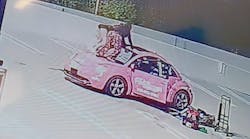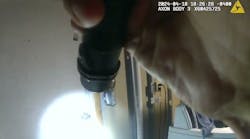Ahhhhhhhh, the life of a narcotics officer. It is just like the movies, drinking champagne, cruising in your custom Denali, screaming down the water in your "Go Fast" cigar boat, and sitting in a hot tub with a hand-rolled Cuban and seven of the hottest women in the world. Oh, and who can forget the plethora of sweet-ass gadgets at your disposal, all of which have not even made their way to market yet! Yes, unfortunately, this still appears to be the image of the undercover (U/C) narcotics agent, and somehow the foundation or "motivation" for many young officers to make their way into the narcotics world.
Some folks come to police work because they want to wear a "fashionable" polyester uniform and actually help folks. That may be fine for them. However, it is an individual who is totally devoted to the big picture, the greater good if you will, who strives to be a candidate for U/C work. It is important to remember that U/C work has changed dramatically over the past 10 to 20 years. The days of the Lone Ranger going out with a pocketful of money and being a bad guy are over for the most part.
Advances in technology, increased liability and budget constraints have caused many smaller agencies to steer away from U/C operations and, in turn, these causes have put a once common practice on the endangered species list. If an officer is considering U/C work in today's world, for any reason other than the greater good or truly wanting to be a part of a team, then he or she should rethink the idea. The old Playstation II slogan "Live in your world, play in ours" adequately sums up the life of the U/C operative. It is American policing at its best but no one ever said being the best would be easy.
One of the most frequent and disturbing comments often heard from young officers is, "I really want to get into narcotics work. It looks easy and I think I would be really good at that sort of thing." Let me give you some insight into the error behind this sort of thinking by sharing my big break as an U/C operative. It came in 1999, in the form of a cold beer with a good friend, who was a sergeant with a relatively small agency. With some idle bar talk over the increase of methamphetamine production and a few mentions of the "who's who" in the county, my friend asked me a question that would change my life forever, "Bro, do you want to try and work some dope for us?" I couldn't answer quickly enough, "Hell yeah," I stated. "When do I start?" After about two weeks, I was contacted by the sheriff and asked to meet the sergeant and the chief deputy in a remote location somewhere just south of the county. Upon my arrival, I was placed in an orange jumpsuit, handcuffed and taken to the sheriff's office where I was fingerprinted and run through the paces to give the impression of being booked in. All the while I was being fingerprinted, I kept telling myself, "This must be how it's done. This must be how everyone gets introduced into the undercover world."
Following the booking process, I was placed in a single holding cell where I sat until the judge was free to swear me in. His chambers were across the street and could easily be seen from my jail cell. As time seemed to drag by, the knot in my stomach began to grow. "Surely there will be some instruction once I am sworn in," I continued to tell myself. After about six hours, I was paraded across the street to the judge's chamber where I was sworn in and vowed to uphold the laws of the state and county. "Congratulations," the judge replied, as I was shuffled out the door. The walk back was different than the walk over. This time, I was handed a roll of cash (which I quickly concealed in my jumpsuit), given a quick nod and the words I remember as if it were yesterday, "We've got a lot riding on this, man. Go out and make something happen."
Approximately a year later, I found myself divorced, out of work, tired and now under the microscope for a list of allegations, rumors and scandal surrounding my entire operation. After days of being interrogated, I found myself alone and fighting to defend my every action, more than the people I was trying to put behind bars. It was as if a veil was thrown over the entire drive of our operation and I was now the one on trial.
One pearl of wisdom I'd like to extend to other officers is to "read the writing on the wall." If an agency appears to be working on a frail operating budget, plagued by internal drama, lacking regular training, and regularly inundated with highs and lows, the same infection will slowly fester in your U/C operation. A successful operation must always start with a professional department backing it.
Picture of successDepartments are constantly fighting the war on operational funding, and day-to-day operations will typically come before spending money on the war against drugs. A department wanting to start an U/C operation or an officer desiring work as an U/C operative must ensure long-term essentials are reviewed before introducing an U/C agent to the field.
These include but are not limited to: Money, training, money, training, training, money, training and money. I think you understand where I am going with this. Narcotics-specific training for ALL team members prior to the start of an U/C operation combined with financial backing for long-term missions are absolute musts.
Financial constraints can add time restrictions and stress to any mission and, almost certainly, cause agents to act hastily in an attempt to accelerate the investigation. This can cause safety concerns and at times affect ethical decision-making skills. The tempo and pace of any operation should be set by upper-level administrators with an optimistic yet realistic approach. One buy a week was the predetermined goal set by a sheriff I worked with early in my U/C career. "What if we can't produce?" I asked. "Then you aren't doing your job," I was told. In my opinion, this is an unrealistic goal that operations should steer clear of. Although from a monetary and administrative standpoint we want to be successful in our mission, there should never be a set number [of buys] as a goal early on in any operation.
More times than not, I have been approached by agencies wanting to initiate an U/C operation with no additional manpower, training and/or funding, and every time, there is someone standing in the wings waiting to take a stab at it. Agencies wishing to take a proactive approach toward narcotics work must first realize there must be just as much focus aimed at spending money as on the goal or focus at hand. When developing an operational budget, administrators must take into consideration that money will be needed for drug purchases, extra agent or staff salaries, specialty vehicles, alternative housing (i.e. hotel rooms or apartments), and miscellaneous expenses.
The right man for the jobIn today's policing, it is more important than ever to have dedicated team players assigned to a narcotics section. Giving the especially heightened risk involved in U/C operations, careful consideration and training must be given to the selection of the "perfect" candidate. The motivation of the candidate, his or her personal and professional background, financial or credit status, mental and physical conditioning are all important ingredients in a successful operation.
Contrary to popular beliefs, U/C work is not an assignment that will cause the officer to become a heroin-injecting junkie or isolate him from friends and family but one that will mandate an unusual work schedule and prevent him from discussing day-to-day activities with individuals outside the unit. The unique hours of operation mixed with the stress of one-on-one contact with alleged dealers can add stress and nervous tension to many agents, furthering the need to diligently select a good candidate from the operation's onset.
Although my experience as an U/C operative has been a rewarding and fulfilling venture, it has also opened my eyes to the high demands from both an agent and administrative standpoint. I encourage anyone wanting to pursue an U/C operation to do your homework and remember that all that glitters is not gold.
Darin Logue started his work in the narcotics world in 1999. Working as a freelance narcotics agent for departments plagued by financial constraints or not affiliated with a task force, the author has held numerous commissions throughout the Midwest working at times for less than minimum wage. When he first began working undercover, Logue recalls working with no badge, no gun, no radio, no backup, no surveillance and no cell phone. After approximately nine years of undercover work, Logue currently acts as a consultant and part-time agent for a major Midwest taskforce and as a trainer in various aspects of narcotics work.


